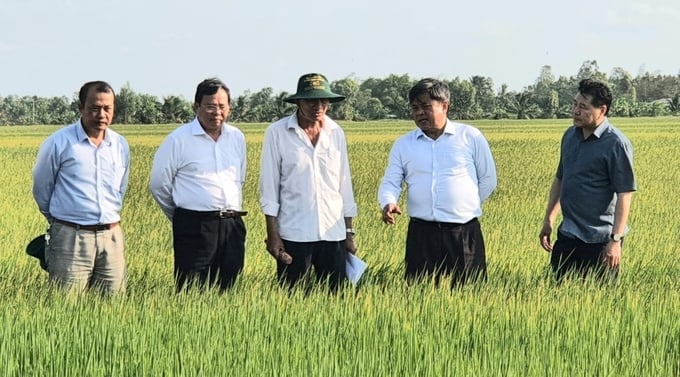November 25, 2025 | 15:15 GMT +7
November 25, 2025 | 15:15 GMT +7
Hotline: 0913.378.918
November 25, 2025 | 15:15 GMT +7
Hotline: 0913.378.918

Deputy Minister of Agriculture and Rural Development Tran Thanh Nam (second from the right) is the Deputy Head of the Steering Committee for the High-Quality, Low-Emission 1 Million Ha of Rice Project.
On May 30, the Minister of Agriculture and Rural Development signed Decision No. 1492/QD-BNN-KH regarding the assignment of tasks to members of the Steering Committee for the implementation of the "Sustainable Development of 1 Million Ha of High-Quality, Low-Emission Rice Cultivation Linked with Green Growth in the Mekong Delta Region until 2030" project.
Accordingly, Minister of Agriculture and Rural Development Le Minh Hoan is the Head of the Steering Committee, providing overall guidance and direction on all aspects and tasks of the project. The Deputy Head of the committee is Deputy Minister of Agriculture and Rural Development Tran Thanh Nam, who is responsible for directly overseeing the implementation of the project.
The members of the Steering Committee represent the leadership of the People's Committees of the 12 provinces and cities in the Mekong Delta region. Based on the actual situation, these localities will establish steering committees and support teams to facilitate the implementation of the project, while also restructuring the entire apparatus of the VnSAT Project to promptly carry out the assigned tasks.
Previously, approved by the Government on November 27, 2023, the project "Sustainable Development of 1 Million Hectares of High-Quality, Low-Emission Rice Cultivation Linked with Green Growth in the Mekong Delta Region until 2030" is being implemented in two phases.
Phase 1, implemented from 2024 to 2025, focuses on consolidating the 180,000 ha of rice cultivation areas already covered by the VnSAT Project. This project, spanning the entire Mekong Delta region and lasting for 7 years, aims to enhance farming efficiency and increase income for farmers, while also reducing environmental pollution and greenhouse gas emissions in agriculture.
Phase 2 will expand to an additional 820,000 ha of rice cultivation, to be implemented by 2030. The overarching goal of the project is for high-quality, low-emission rice to account for over 20% of the total rice exports from the specialized cultivation area, with average profits for rice growers reaching over 40%.
The People's Committees of the 12 localities are responsible for directing the Department of Agriculture and Rural Development to coordinate with relevant departments, sectors, and localities to implement the project. Annually, the Department of Agriculture and Rural Development will develop specific plans for each phase.
The Steering Committee for the 1 Million Ha of High-Quality, Low-Emission Rice Cultivation Project also includes representatives from the Ministry of Planning and Investment, the Ministry of Natural Resources and Environment, the Ministry of Finance, and the State Bank of Vietnam.
According to Decision No. 1492, the Ministry of Planning and Investment will determine the state budget investment capital allocated for development investments by sector and field in the medium-term and annual public investment plans to implement projects as stipulated by the Public Investment Law.
The Ministry of Finance, with its authority, will allocate funds from the central budget to implement policies and regulations in accordance with the State Budget Law and relevant legislation.
The Ministry of Natural Resources and Environment will collaborate with the Ministry of Agriculture and Rural Development to develop and issue regulations on measurement, reporting, and assessment of greenhouse gas emissions reduction for high-quality, low-emission rice cultivation areas within the project. Additionally, they will develop pilot policies and mechanisms to prioritize carbon credit payments based on performance for high-quality rice cultivation areas.
The State Bank of Vietnam will consider issuing credit programs to support the production, processing, and consumption of high-quality, low-emission rice products in the Mekong Delta region, connecting cooperatives with enterprises. They will also guide localities and enterprises to participate in relevant credit programs.
On the afternoon of May 27, Prime Minister Pham Minh Chinh received Ms Manuela V. Ferro, Vice President of the World Bank(WB), and Ms Mariam J. Sherman, WB Country Director for Vietnam, Laos, and Cambodia, along with their delegation.
The Prime Minister welcomed the WB's proposal for a loan of more than $ 11 billion over the next five years and suggested that this capital should focus on major projects in key areas such as the program for 1 million hectares of high-quality, low-emission rice in the Mekong Delta; large-scale, sustainable infrastructure projects; and clean energy projects such as the urban railway project from central Hanoi to Hoa Lac and the high-speed railway project from Ho Chi Minh City to Can Tho.
Translated by Hoang Duy

(VAN) In addition to strengthening the relationship between schools and enterprises, the Aus4Skills project expands opportunities for female students and people with disabilities to work in the transport and logistics sector.

(VAN) Nghe An is preparing policy, technical, and resource steps to participate in the forest carbon credit market.
/2025/11/25/1648-2-110733_532.jpg)
(VAN) From 2011 to 2023, Ca Mau province lost approximately 6,200 ha of coastal land and protection forests due to erosion, threatening many residential areas, infrastructure facilities, and production zones.

(VAN) Quang Ngai holds strong potential for carbon credits but needs a clear legal and policy framework to secure sustainable revenue from this resource.

(VAN) With its diverse ecosystem, Phu Quoc National Park plays a vital role in environmental protection and biodiversity conservation and serves as the core zone of the Kien Giang World Biosphere Reserve.

(VAN) Cooperation activities under the Aus4Skills program focus on: logistics professional development, competency-based training and assessment (CBTA), leadership innovation, and digitalization.

(VAN) Minister Tran Duc Thang has affirmed that the models developed by Que Lam Group serve as a practical foundation for the Ministry of Agriculture and Environment to direct wide-scale replication.